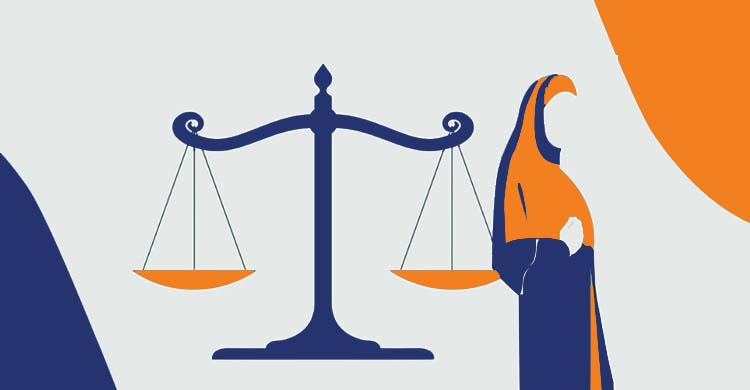Balancing Women’s Right of Dower in the Socio-economic Context of Bangladesh

Jahedul Islam Sourov : Muslim marriage is a civil contract that requires certain conditions to be fulfilled before it can be identified as a valid marriage. Dower, which can be termed as a token of love or an unsecured debt, is payable to the wife. It is a mandatory requirement for the recognition of a marriage as valid. The other required conditions for a Muslim marriage are proposal, acceptance, witness, etc. A valid marriage allows the spouse to establish a conjugal relationship between them till its dissolution.
Nowadays, as we notice, the rate of dissolution of conjugal relationships is at its peak. This process can take place either by initiating divorce or the demise of a partner. The question of major concern that may arise in someone’s mind is: the way the rate of divorce as well as the inflation is increasing, are we balancing the decreasing value of money with the unpaid amount of dower? Dower can be of various types, such as prompt, deferred, proper, specified, etc.
In the socio-economic condition of Bangladesh, here we used to see the practice of deferred dower in most cases. If the payment of the dower is delayed but specified, then it is called deferred dower. This deferred dower is creating a loophole in the statutes where no mention has been made regarding the delayed payment of the dower amount balancing it with the rate of inflation for each consecutive year. The matter of dower, including the other four matters of Muslim personal laws, is under the jurisdiction of family court established under the Family Court Act, 2023. The problem arising from this loophole can be easily understood from an example:
Jahanara Begum got married to Sobuj Mia in 1980. They had 1 son and 1 daughter. They continued their conjugal relationship peacefully till 2022, when in 2023 Sobuj Mia filed for divorce. The then (1980) fixed dower amount was 30 thousand taka which was an adequate amount for conducting marriage for a lower middle-class family. But, in today’s scenario, this money has decreased a lot in value. This situation makes the women directly affected, as the dower amount works as a security for them considering the situation in Bangladesh. This lesser amount of dower (considering today’s monetary value) can trigger the husband to use the power of divorce arbitrarily.
To deal with this problem developed countries like Iran are following a very effective method. They are converting the dower amount to gold coins, which keeps the interest of women intact even if divorce is filed after a longer period of time. This method helps to balance the then amount of dower, which was less considering today’s monetary value to be increased in amount. It ensures that the woman may not be aggrieved by the dissolution of marriage. This balancing interest method also has religiously valid ground from some Islamic scholars. According to Abu Yoosuf, a scholar of Hanafi school of Islamic jurisprudence- “the debtor is obliged to pay back the value of the money that went through a rise or fall in value at the time of agreement compared to the market value.” Ar-Rahooni, a scholar from Maliki school of Islamic jurisprudence is of the view that- “if the difference is very large compared to the market value then what must be paid back is the value of the money that went through increase or decrease, but if the difference is not so great, then it must be repaid in the same amount.”
In our country, we need to adopt this kind of method by amending the existing legal provisions. Our legislature should take initiative to introduce such interest-friendly measures considering the situation of the vulnerable woman. Bangladesh being a developing country, the amount of people’s per capita income and quality of life is increasing day by day. As a result, people’s capability regarding earnings is also going upwards. So, considering the circumstantial demand, our legislature needs to take initiative to adapt the laws with the changing needs of the society by enacting new women’s interest-friendly provisions in the personal laws keeping no scope of deprivation from the side of woman if divorce is initiated.
The author is an LL.M student at Gopalganj Science and Technology University.

